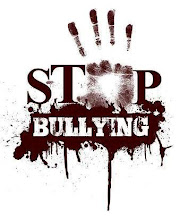For student, the best way to solve a bullying problem is to tell a trusted adult. For teens, though, the tell-an-adult approach depends on the bullying situation. One situation in which it is vital to report bullying is if it threatens to lead to physical danger and harm. Numerous high-school students have died when stalking, threats, and attacks went unreported and the silence gave the bully license to become more and more violent.
Sometimes the victim of repeated bullying cannot control the need for revenge and the situation becomes dangerous for everyone. Adults in positions of authority — parents, teachers, or coaches — can often find ways to resolve dangerous bullying problems without the bully ever learning how they found out about it.
If you're in a bullying situation that you think may escalate into physical violence, try to avoid being alone (and if you have a friend in this situation, spend as much time together as you can). Try to remain part of a group by walking home at the same time as other people or by sticking close to friends or classmates during the times that the bullying takes place.
• Ignore the bully and walk away. It's definitely not a coward's response — sometimes it can be harder than losing your temper. Bullies thrive on the reaction they get, and if you walk away or ignore hurtful emails or instant messages, you're telling the bully that you just don't care. Sooner or later the bully will probably get bored with trying to bother you. Walk tall and hold your head high. Using this type of body language sends a message that you're not vulnerable.
• Hold the anger. Who doesn't want to get really upset with a bully? But that's exactly the response he or she is trying to get. Bullies want to know they have control over your emotions. If you're in a situation where you have to deal with a bully and you can't walk away with poise, use humor — it can throw the bully off guard. Work out your anger in another way, such as through exercise or writing it down (make sure you tear up any letters or notes you write in anger).
• Don't get physical. However you choose to deal with a bully, don't use physical force (like kicking, hitting, or pushing). Not only are you showing your anger, you can never be sure what the bully will do in response. You are more likely to be hurt and get in to trouble if you use violence against a bully. You can stand up for yourself in other ways, such as gaining control of the situation by walking away or by being assertive in your actions. Some adults believe that bullying is a part of growing up (even that it is character building) and that hitting back is the only way to tackle the problem. But that's not the case. Aggressive responses tend to lead to more violence and more bullying for the victims.
• Practice confidence. Practice ways to respond to the bully verbally or through your behavior. Practice feeling good about yourself (even if you have to fake it at first).
• Take charge of your life. You can't control other people's actions, but you can stay true to yourself. Think about ways to feel your best — and your strongest — so that other kids may give up the teasing. Exercise is one way to feel strong and powerful. (It's a great mood lifter, too!) Learn a martial art or take a class like yoga. Another way to gain confidence is to hone your skills in something like chess, art, music, computers, or writing. Joining a class, club, or gym is a great way to make new friends and feel great about yourself. The confidence you gain will help you ignore the mean kids.
• Talk about it. It may help to talk to a guidance counselor, teacher, or friend — anyone who can give you the support you need. Talking can be a good outlet for the fears and frustrations that can build when you're being bullied.
• Find your (true) friends. If you've been bullied with rumors or gossip, all of the above tips (especially ignoring and not reacting) can apply. But take it one step further to help ease feelings of hurt and isolation. Find one or two true friends and confide how the gossip has hurt your feelings. Set the record straight by telling your friends quietly and confidently what's true and not true about you. Hearing a friend say, "I know the rumor's not true. I didn't pay attention to it," can help you realize that most of the time people see gossip for what it is — petty, rude, and immature (D'Arcy Lyness, PhD)
By: Hartini



1 comment:
description Louis Vuitton replica Bags useful link bags replica gucci my sources Ysl replica
Post a Comment